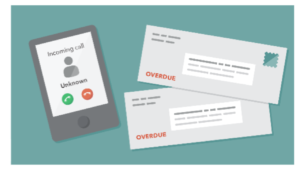
Introduction:
There are a ton of scams that exist. And scammers will find their next victim using all kinds of mediums. Phones, the Internet, text messages, and so on. It doesn’t matter what they use. As long as they achieve their main objection of extracting as much money from you as possible, they’ll do whatever it takes to sucker you in. But luckily you just so happen to be stumbling across this. Our mission here is to make sure that you don’t become the next victim in scams like the one we’ll be talking about here.
We’ll be talking about a scam known as a “debt collection scam”. This is one of the many telephone scams that still happen even to this day. And people like the elderly and the unaware, are more likely to fall victim to this scam. And you may also become a victim too, if you’re not made aware of what they are, how they operate, and how you can protect yourself from this type of scam.
Let’s dig into what they’re all about, how they work, and what you need to do in order to prevent yourself from becoming the next victim.
How Debt Collector Scams Started:

Like many telephone scams, the debt collector scam has been around for quite some time now. It’s unclear when this exactly started. But, as technology changed, scammers would often use the newer technology to employ their scammy tactics on would be victims. Today, you’ll often see scammers use fake telephone numbers (especially numbers that claim to be a local number).
Some will also use VoIP software. Which means they can make calls using a telephone system on an online browser. While they’ll likely use United States numbers, there’s a good chance that they are actually operating outside of the country. So these numbers may just be a little hard to trace.
7 Ways To Tell Which Debt Collector Is Real From The Fake?:
In order to distinguish a real debt collector from a fake, you’ll need to know the difference in protocol. The following details we’re about to cover are some warning signs, plus a brief summary of what debt collectors actually due in a real situation:
1.) Withholding Information:
Obviously, having debt is a thing that you can have. And you can pay it off at a time that is agreed by you and the debt collector. A legitimate debt collector will have information on hand that will be given to you like the name of the creditor, and the amount of debt owed. If you dispute the debt, the collector will have to obtain verification of the debt.
If the collector does not provide this information during contact, they are required to send you a written notice within five days of the initial contact. A scammy debt collector will do the opposite, and refuse to disclose any information.
2.) Pressures You To Pay Via Money Transfer or Prepaid Card:
Why money transfers or prepaid cards? Because these methods are hard to trace. But a real debt collector would prefer if you sent your payments in the form of a check, or money order.
3.) Threats Of Jail Time Or Impersonates As A Government Official:
This is a slippery slope here. Yes, there are debts out there that you would have to pay or otherwise you’ll face being locked up. But these debts might be through the justice system. So unpaid fines might lead to you being arrested. But debts from some unknown company will not get you arrested. Scammers will use this as a scare tactic to ensure that you comply. Do not fall for this trick.
4.) They Threaten To Reveal Your Debt To Your Friends, Family, Employer, Etc.:
This is another scare tactic that they’ll employ on unsuspecting people. At this point, it’s kind of ridiculous. Your spouse should already know about your debts and other bills that need to be paid. A real debt collector would keep information like this strictly confidential. They will not reveal any information to your friends, family, or your employer regarding your debt. A debt collector can only relay any information concerning your debt to your next of kin, should you die and had yet to pay the debt off. That is the only exception to the rule. But it does come with a verification process, for security purposes.
5.) If You Don’t Recognize The Debt!:
If you don’t recognize the debt, try to ask as many questions as possible. Be sure to confirm that it is indeed a debt of which you owe.
6.) They Start Asking You For Sensitive Information:
This of course consists of your bank account or credit card information, social security number, routing numbers, or anything that is tied to your identity. You should never reveal any personal information to a scammer, or someone you don’t recognize online. But if there’s confirmation that the debt is indeed yours and you are dealing with a real debt collector, then you can give out any pertinent information.
7.) They Call You At Unusual Times:
If you get a phone call from a so-called “debt collector” before 8AM or after 9PM, there’s a good chance that you’re dealing with a scammer. Real debt collectors will call you during normal business hours.
3 Ways To Protect Yourself:
Here are some steps you could follow to protect yourself, in the event you do encounter a scammy debt collector:
1.) Ask For A Callback Number:
Giving out information over the phone is a very uncomfortable thing. With that in mind, you’ll need to request some specific information from the caller. You’ll need to request the caller’s name, the name of the company, street address, city/state/zip code, and a callback number. You can use this information to make sure they are the real deal, or if they are a scammer trying to steal your hard earned money. If you call back and the number is not functioning, it could be a scam.
2.) Be Sure That You Know Information About Your Debt Before You Pay Anything!!
A smart thing you could do before you pay any debt collector, is confirm whether or not the debt is actually yours. Be sure to request written information from the debt collector, that would confirm that you really do owe this debt to them. Do not pay anything until that written confirmation is sent to you.
3.) Contact The Original Creditor:
If you believe you’re dealing with a scammer, it is important to get in touch with the original creditor, thru the information you was previously provided, when you applied for the loan. Find out who is actually assigned to collect the debt on their behalf.

My Conclusion For Debt Collector Telephone Call Scams!!:
While dealing with debt is a serious issue, knowing which debt collector is real from the fake, is something you’ll need to know. Be sure to take heed to the warning signs discussed above and protect yourself from this kind of scam, if it were to happen.
Do you have any experience with being scammed by fake debt collectors? Do you have any questions concerning this scam review? If you do, please leave your comments or questions below, and I will be more than happy to get back to you. Thanks again for checking out my post, and good luck with your success online..
Were you looking for my top, legit work online recommendation instead?
Click here To Read My # 1 Recommendation!
Also, if you enjoyed reading and educating yourself on debt collector phone call scams, please don’t limit yourself. Feel free to read and learn “all about” a different, online scam/scheme review like:
“All About” 4 Different Visa Scams
“All About” Phone Call From Recruiter Scams
“All About” Fake Prizes And Sweepstakes Scams
“All About” T.V Informercial Scams
And Much More..


